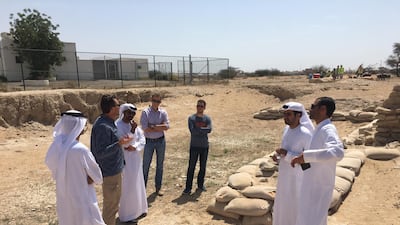Archaeological excavations have restarted at one of the country’s most significant historical sites in Al Ain.
Emirati and international experts are back at Hili 8 in a project commissioned by Abu Dhabi Tourism and Culture Authority (TCA).
Hili 8 is believed to be the location of one of the earliest agricultural settlements in the country, dating back about 5,000 years.
The site, close to the Hili Archaeological Park, was examined by a team of French archaeologists in the 1970s and 1980s. Their work played a vital role in helping areas of the city to be inscribed as a Unesco World Heritage Site in 2011.
Work started in March and so far, artefacts have been recovered, as well as plant and animal remains. These will be subject to tests including carbon-14 dating. The plant remains are also being analysed. Tiny burnt fragments of seeds found on archaeological sites can rarely be seen with the human eye, so soil in which the remains are contained is now being floated in water. The ancient seeds then float to the surface and can be analysed. TCA built a special system for conducting this work which also uses recycled water, it said.
A 3D picture of soil and sand deposits that had built up in the area since the original excavations has also been made. The team used the same system to record the many Bronze Age tombs in this area.
“I was happy to work at one of most important archaeological sites in Al Ain and a world heritage site,” said Hamdan Al Rashedi, TCA archaeologist.
“The excavation will help us better understand Hili 8 and the nature of life at that time. The team is very experienced in the region with the latest techniques and I benefited a lot from working with them.”
A complete account of the French team’s work at Hili 8 more than three decades ago has never been published. The archaeologists uncovered evidence for the beginnings of date, wheat and barley cultivation in the country. The work of Professor Serge Cleuziou in particular, director of the French Archaeological Mission to Abu Dhabi, brought him to international prominence. He died in 2009.
It is hoped that the findings from the new excavations will support evidence that points to Hili 8 as being one of the earliest places in the UAE in which an agricultural-based society formed, as opposed to a pastoral nomadic existence.
_____________
Read more:
Emirati students dig to understand the past at Hili Oasis archaeological site


